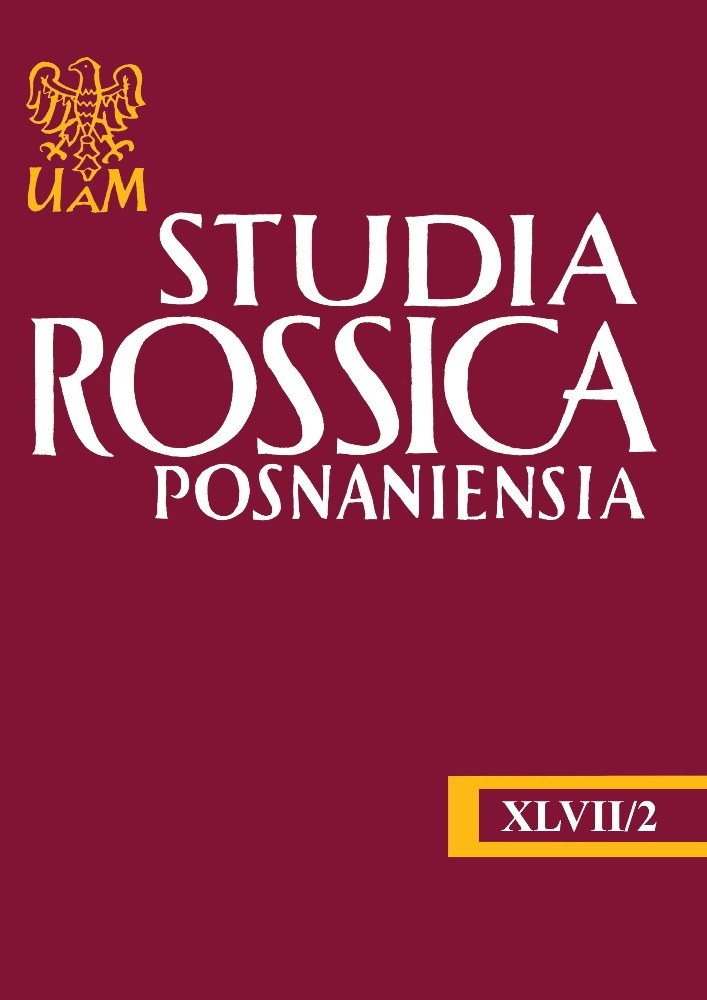Аннотация
The article analyzes Olga Lavrenteva’s graphic novel Survilo, which echoes the terror, especially the Stalinist repression and the blockade of Leningrad. Lavrenteva is a graphic artist, author of comic books, representative of the third generation, who presents the story of her grandmother, Valentina Survilo, and her relatives in an unconventional form. Translated into the language of comic books, this family story focuses on the fate of many inhabitants of the Soviet Union. At the same time, as if on the sidelines, Lavrenteva raises an important issue – the coexistence of memory and affect, which is the result of long-term silence. Survilo is not only a record of the past but also of the emotional states of her grandmother, the paralyzing fear that accompanied her, i.e. the physical and psychological costs that the survivors had to bear. Lavrenteva’s graphic novel successfully fits into the new practices of commemoration and witnessing, which are still a novelty in Russia, carrying a great potential for critical revision of the dark past, and – above all – for building a community of memory based on the foundations of intergenerational dialogue.
Библиографические ссылки
Ârov, Sergej. Blokadnaâ ètika. Moskva, ZAO Izdatelʹstvo Centrpoligraf, 2013.
Budrewicz, Zofia. „Wstęp”. Pamięć i afekty. Red. Zofia Budrewicz, Roma Sendyka, Ryszard Nycz. Warszawa, Wydawnictwo IBL PAN, 2014, s. 7-14.
Dauksza, Agnieszka. „Ustanawianie świadka”. Teksty Drugie, 3, 2018, s. 69–96. https://doi.org/10.18318/td.2018.3.5 DOI: https://doi.org/10.18318/td.2018.3.5
Èpple, Nikolaj. Neudobnoe prošloe. Pamâtʹ o gosudarstvennyh prestupleniâh v Rossii i drugih stranah. Moskva, Novoe literaturnoe obozrenie, 2020.
Ètkind, Aleksandr. Krivoe gore. Pamâtʹ o nepogrebennyh. Per. Vladimir Makarov. Moskva, Novoe literaturnoe obozrenie, 2016.
Forecki, Piotr. „Zagłada i krajobraz po Zagładzie w komiksowych kadrach”. Poznańskie Studia Polonistyczne, 25 (45), 2015, s. 275-308. https://doi.org/10.14746/pspsl.2015.25.12 DOI: https://doi.org/10.14746/pspsl.2015.25.12
Harris, David Alan. „The Paradox of Expressing Speechless Terror: Ritual Liminality in the Creative Arts Therapies’ Treatment of Posttraumatic Distress”. The Arts in Psychotherapy, 36, 2009, s. 94–104. https://doi.org/10.1016/j.aip.2009.01.006 DOI: https://doi.org/10.1016/j.aip.2009.01.006
Kak govoritʹ o blokade i repressiâh na âzyke komiksa. Intervʹû s hudožnicej Olʹgoj Lavrentʹevoj. Web. 22.07.2021. https://www.the-village.ru/weekend/art/342387-komiks-o-blokade.
Klimek-Dominiak, Elżbieta. „Żydowsko-amerykański komiks (auto)biograficzny: powieść graficzna czy pamiętnik graficzny”. Autobiografia, 1 (8), 2017, s. 121–132. https://doi.org/10.18276/au.2017.1.8-09 DOI: https://doi.org/10.18276/au.2017.1.8-09
Langer, Laurence L. „Dwa głosy: Cynthia Ozick i Art Spiegelman”. Literatura na Świecie, 1-2, 2004, s. 95–103.
Langer, Laurence L. Świadectwa Zagłady: w rumowisku pamięci. Przeł. Marcin Szuster. Warszawa, Żydowski Instytut Historyczny, 2015.
Lavrent’eva, Ol’ga. Obo mne. Web. 22.08.2021. https://olga-lavrenteva.ru/biography/.
Lavrent’eva, Ol’ga. Survilo. Sankt-Peterburg, Bumkniga, 2020.
Ławrientjewa, Olga (rysunki), Paweł Timofiejuk (scenariusz). „Koty Ermitaża”. City stories 11. Kadry i ramki: rosyjsko-polskie konfrontacje komiksowe. Red. Ewa Stępień. Łódź, Stowarzyszenie Twórców Contur, 2016, s. 53-70. https://doi.org/10.4103/1110-1083.183405 DOI: https://doi.org/10.4103/1110-1083.183405
Matusiak, Agnieszka. Wyjść z milczenia. Dekolonialne zmagania kultury i literatury ukraińskiej XXI wieku z traumą posttotalitarną. Wrocław, KEW im. Jana Nowaka-Jeziorańskiego, 2020. https://doi.org/10.52040/7893.3 DOI: https://doi.org/10.52040/7893.3
„Maus” pretknoveniâ. Goneniâ na komiks v RF i kuda èto vse skatilos’. Web. 12.08.2021. https://medialeaks.ru/2804mess_maus/.
Nesmešnye kartinki. Sbornik komiksov o žertvah Gulaga. Web. 15.08.2021. https://www.svoboda.org/a/29851508.html.
Oborin, Lev. Priehatʹ i najti ničego. Web. 15.08.2021. https://polka.academy/materials/830.
Pawletko, Beata. Blokada Leningradu i jej reprezentacje w świetle innych doświadczeń granicznych. Katowice, Wydawnictwo „Śląsk” i SIW, 2016.
Pawletko, Beata. „Szkice (z) przeszłości. O wizualnych reprezentacjach Gułagu”. Przegląd Rusycystyczny, 3, 2018, s. 65-80.
Sandomirskaâ, Irina. Blokada v slove. Očerki kritičeskoj teorii i biopolitiki âzyka. Moskva, Novoe literaturnoe obozrenie, 2013.
Sbornik grafičeskih novell „Vy-živšie. Gulag”. Web. 29.07.2021. https://planeta.ru/campaigns/rememberthegulag.
Szyłak, Jerzy. Coś więcej, czegoś mniej. Poszukiwanie formuły powieści graficznej w komiksie 1832–2015. Poznań, Fundacja Instytut Kultury Popularnej, 2016.
Szyłak, Jerzy. Komiks. Kraków, Znak, 2000.
Tabaszewska, Justyna. „Zepsuty afekt”. Ciała zdruzgotane, ciała oporne. Afektywne lektury XX wieku. Red. Adam Lipszyc, Marek Zaleski. Warszawa, Wydawnictwo IBL PAN, 2015, s. 268–307.
Talwar, Savneet. „Accessing Traumatic Memory through Art Making: An Art Therapy Trauma Protocol (ATTP)”. The Arts in Psychotherapy, 34, 2007, s. 22-35. https://doi.org/10.1016/j.aip.2006.09.001 DOI: https://doi.org/10.1016/j.aip.2006.09.001
Traba, Robert. „Procesy zbiorowego pamiętania i zapominania. Trzy przypadki i ich konsekwencje dla badacza pamięci zbiorowej”. Pamięć i afekty. Red. Zofia Budrewicz, Roma Sendyka, Ryszard Nycz. Warszawa, Wydawnictwo IBL PAN, 2014, s. 367-394.
Tuszyńska, Kamila. Narracja w powieści graficznej. Warszawa, PWN, 2015.
Tuszyńska, Kamila. „Polskie komiksy okolicznościowe i użytkowe: historyczne, religijne, społeczne”. Napis, 17, 2011, s. 347-362. https://doi.org/10.18318/napis.2011.1.26 DOI: https://doi.org/10.18318/napis.2011.1.26
Ušakin, Sergej, Ekaterina Mahotina, Mihail Gabovič, Nikita Lomagin, Dar’â Hlevnûk, Liza Kiršenbaum, Irina Sandomirskaâ. „Pamâtʹ o blokade – blokada pamâti”. Neprikosnovennyj zapas, 5, 2019. Web. 12.08.2021. https://magazines.gorky.media/nz/2019/5/pamyat-o-blokadeblokada-pamyati.html.
Zaleski, Marek. „Historyczna teraźniejszość, czyli przestrzeń afektu”. Ciała zdruzgotane, ciała oporne. Afektywne lektury XX wieku. Red. Adam Lipszyc, Marek Zaleski. Warszawa, Wydawnictwo IBL PAN, 2015, s. 308-366.
Żejmo, Bożena. „Imperium traumy, czyli między szeptem a milczeniem (Dziewczyna moich marzeń Bułata Okudżawy)”. Przegląd Rusycystyczny, 3, 2018, s. 48-64.
Лицензия
THE ARTICLES ARE PUBLISHED UNDER THE CREATIVE COMMONS LICENCE:
Attribution-NonCommercial-ShareAlike 4.0 International License.
Authors of texts accepted for publication in “Studia Rossica Posnaniensia” are required to complete, sign and return to the editor's office the Agreement for granting a royalty-free license to works with a commitment to grant a Creative Commons sub-license.
Under the agreement, the authors of texts published in “Studia Rossica Posnaniensia” grant the Adam Mickiewicz University in Poznań a non-exclusive, royalty-free license and authorize the use of Attribution-NonCommercial-ShareAlike 4.0 International (CC BY-NC-SA 4.0).
The authors retain the right to continue the free disposal of the work.
Internet users are entitled to use works published in “Studia Rossica Posnaniensia” since 2016, for non-commercial purposes only, under the following conditions: https://creativecommons.org/licenses/by-nc-sa/4.0/
Adam Mickiewicz University in Poznań retains the right to magazines as a whole (layout, graphic form, title, cover design, logo etc.).

